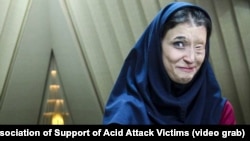On Oct. 2, Ayatollah Yousef Tabatabai-Nejad, the appointee of Iran’s Supreme Leader Ali Khamenei in the central city of Isfahan, spoke during the Friday prayer he led about the need for tougher measures against women who chose to wear their headscarves more loosely than required by Islamic law.
After media reports of his remarks broke in Isfahan and Tehran, he came under public criticism for inciting violence.
Iran’s deputy minister of communications, Amir Nazemi, tweeted that Tabatabai-Nejad must make it clear that he was not calling for physical violence.
In response, Tabatabai-Nejad released a statement accusing the media of lying and falsifying his words.
“The misunderstanding of this example and the incorrect mentality of some media outlets caused them to divert public opinion from the main issues and problems of the country by fragmenting the mentioned speech, lying and inducing self-made material,” Tabatabai-Nejad said in the statement.
The claim is false.
Multiple news media, including state-controlled outlets in Iran, published transcripts of Ayatollah Tabatabai-Nejad’s sermon.
According to these publications, he said that women wearing hijab “improperly” are a “security issue,” a “moral anomaly” and “violators of human rights.” He also said, “we should not be afraid” to deal with them “in accordance with God; those who are not afraid of breaking the law must be stopped.”
Tabatabai-Nejad proposed that the police, security forces and judiciary unite in handling the problem, but that the legal system alone is not enough.
“The society should be made unsafe” for women who wear loose headscarves, he said. “They should not be allowed to easily break the norms in streets and parks.”
Also, on Oct. 2, another Khamenei appointee – Abolghasem Yaghoubi in Bojnord, the capital city of North Khorasan province – echoed Tabatabai-Nejad’s remarks during Friday prayers that he led.
“Bad hijab is a dangerous virus,” Yaghoubi said, adding that the “lives of bad hijab wearers should be made unsafe.”
The two influential clerics’ calls for cracking down on women who “disrespect the hijab” coincided with the anniversary of a series of coordinated acid attacks on women in Isfahan in 2014, which terrorized the city for weeks. At least eight attacks were reported, with motor bikers splashing acid onto the faces of women and girls. The victims were left with scars and some lost eyes.
The attacks prompted mass protests that year in Isfahan and Tehran, with participants demanding that law enforcement stop the attacks.
The latest remarks by two de-facto Iranian governors reopened the scars of those acid attacks, Al-Monitor reported.
Victims of the 2014 attacks have spoken out against the two clerics, calling on them to stop making threats and expressing fear that their statements will unleash another wave of violence.
“In those days, fear had taken over the whole city. The fear of going out, the fear of the streets … and that is all they wanted and got. People were all scared, and this story will be repeated,” Marzieh Ebrahimi, a victim of an acid attack, wrote on Instagram.
In October, 2014, before the acid attacks began in his city, Tabatabai-Nejad had preached during a Friday prayer that “[t]he issue of hijab is beyond the scope of warning, and in order to deal with the lack of hijab, one should raise a wet stick and use force.”





